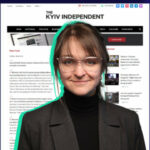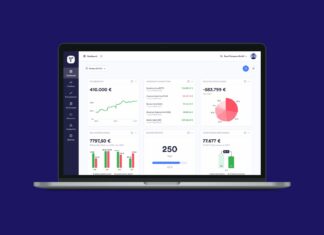Daryna Shevchenko runs The Kyiv Independent while fleeing the bombed capital. The online medium is known worldwide, yet it has only been around for four months. To Medieninsider, the CEO explains how journalism works during wartime.
The first ten days of the war in Ukraine, Shevchenko (photo) stayed in Kyiv. But the bombs came closer and closer. Now she is sitting four hours west of the Ukrainian capital with her dog. From there, she runs the young online medium, which she finances through donations. Her editorial team also continues working: from the front line and the bomb shelter.
[wd_hustle id=“5″ type=“embedded“/]Medieninsider: Ms Shevchenko, how has the war changed The Kyiv Independent?
Daryna Shevchenko: We started in November 2021 and went live with the website in December. At that time, we were operating as a start-up and testing a lot of things. In February we moved into our office in a central district of Kyiv. We celebrated our housewarming party with the team and other journalists a week before the war. Overnight we had to change our approach: Now we report around the clock. We are no longer a start-up, we’ve become the medium of Ukraine.
Were your employees prepared for that?
They’re not beginners. Many staff members came from the Kyiv Post before it was shut down in November*. It’s not like we hired students out of school. We had to switch to 24-hour reporting, working from the front line and online. There are 24 colleagues on my last payroll and we have about 25 volunteers. Some of our foreign staff have fled home because their governments evacuated them. The rest of us are spread across Kyiv, central Ukraine and the western part of the country. Some are working less at the moment because they have to take care of their families, have no access to the internet or spend most of their time in the bomb shelter. But no employee has stopped working for us because of the war.
How did the war change your personal responsibilities?
Before the war, I was very busy with commercial development, talking to advertisers, selling ads, looking after fundraising partnerships and crowdfunding. Or developing our audience I’m in touch with a lot. Now I’m doing pretty much the same thing, but focusing even more on the community. I also talked to many donors and partners who wanted to help me or other Ukrainian media. Just one day before the war, we launched the crowdfunding campaign. I spent the first ten days of the war in Kyiv, the CEO job was tough. We were overwhelmed and understaffed with all the ongoing tension. I used to be a reporter, so I joined my editorial team. But in my district in Kyiv, there was a lot of heavy fighting, a lot of explosions and constant air strike alerts. So I decided to relocate to western Ukraine.
All your employees continue to report. How does it work?
In Kyiv, there are air strike alerts every two hours and people have to get into safety. It’s difficult to work. You can’t be productive in the bomb shelter. There’s usually no internet. Most of our employees in Kyiv are in this situation.
How do you organise your team’s coverage outside the bomb shelters?
It’s crazy, we still have five reporters working from the front in Kyiv. It’s insanely dangerous for them. We don’t assign pieces in combat zones. People volunteer for that. If they do, we make sure they understand the risks involved. Then, if they still want to go, they’ll go. The most courageous reporters seem to do well with that. If I notice that someone on the team wants to flee and doesn’t know how or where to go, I help evacuate them or their family. When necessary, with the help of volunteers and an additional salary.
You’ve received over 1.5 million euros in crowdfunding, do you already have access to the money?
Yes, we have access to it but we’re currently still using the money from our patrons. We are considering investing some of the donations to keep our business running in the long term. Basically, we want to invest in revenue streams or set up a foundation. We haven’t decided yet.
„We think that we need to provide more information in English to the western world“
The Kyiv Independent is getting a lot of international attention. How do you explain your success?
Being an English-language medium with high quality is not that easy. There are not many Ukrainian reporters who speak English at such a high level that they can produce content. When the Kyiv Post fired its entire staff, the reporters who cover content in English came to us. We wanted to become the voice of Ukraine, so we were on the trajectory to do that. We were working with the community, forming partnerships and making money. It happened faster than we expected, but it’s nothing we didn’t expect anyway. We planned it strategically.
How come you decided to publish in English before the war?
Many Ukrainian media are now publishing in English. We think that we need to provide more information in English to the western world. And I think The Kyiv Independent remains the main source of information for the West. We have no problem with competition. The more information, the better.
How does your team cope with the intensive reporting?
We’re hiring because we are hugely understaffed. The team isn’t designed to report around the clock. We need more editors, more reporters, more social media managers – more everything. The volunteers have been helping us since we started publishing mainly on Twitter and Facebook. Then we added Instagram and Telegram. Now we want to start with LinkedIn as well.
You’ve reduced your long pieces on the website since the beginning of the war. Is social media more suitable for reporting in these times?
We still do long pieces, we still have an exclusive section. We created the newsfeed on the website, but that was before the war. Twitter is the most popular platform for our audience with 1.9 million followers, but the website will now grow at the same time. In the first two days of the war, we had a total of 1.5 million page visits, and in the first 15 days of the war, we had a total of 8 million.
The editorial team tweets at high frequency, sometimes 40 times in an hour. How do you verify your information?
When news appears on our website, they’re verified. As verified as it’s possible in times of war. Then they end up on Twitter. The general rule is that we rely as much as possible on official government sources: Government officials, military officials, state officials or governors of the different regions.
Is it easier to get hold of officials in times of war?
The government communication went through the roof as well. Officials communicate quite clearly and frequently. We receive a message from the president every day and information from his spokespeople, arms officials and from governors.
How do you keep your team together in such a time and situation?
That’s the hard part. Everybody takes care of everybody. The chief editor and I started to check in on a one-on-one basis. We had one or two Zoom meetings where everyone who had time attended and talked about their feelings. Daily conferences are not possible because everyone is in a different situation. Everybody is just trying to focus on the job and their survival.
_____
The Interview was lightly edited and condensed for clarity. It was first published in German by Medieninsider on 21st March 2022. Please share it with your friends and colleagues.
*Editor’s note: The Kyiv Post was discontinued in November 2021, the staff was terminated by the owner. Before that, there was a dispute about the independence of the editorial office. Shortly before the outbreak of the war, the Kyiv Post started publishing articles on its website again.
[wd_hustle id=“5″ type=“embedded“/]



